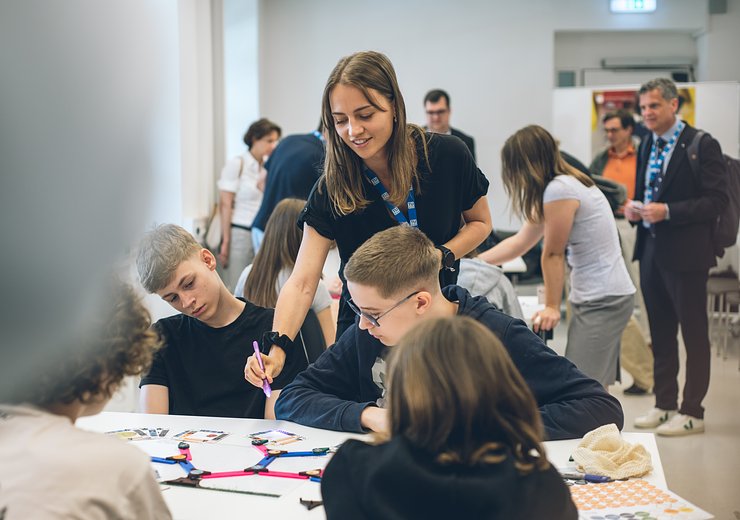eduLAB Bildungsfrühstück: AI in Education
Minister Martin Polaschek and other political stakeholders came together at the eduLAB Bildungsfrühstück to discuss what’s next in education and AI.

Picture: Amélie Chapalain / TU Wien Informatics
About
“Making computer science understandable for everyone – this is what we strive for at eduLAB. With our “unplugged” (computer-free) workshops, we offer a low-threshold introduction to computer science, even for complex topics. With our exploratory approach, our playful tasks, and hands-on materials, we make computer science tangible.”, say Martina Landman & Lukas Lehner, project coordinators for eduLAB.
What’s next for AI and education?
On June 6, Secretary of Education Martin Polaschek and other political stakeholders joined TU Wien Informatics at the eduLAB Bildungsfrühstück (educational breakfast). The event was organized to illustrate the importance of integrating computer science, and especially topics like Artificial Intelligence (AI), into everyday school life. The project is financed by TU Wien and supported by funding from the Wiener Wissenschafts-, Forschungs- und Technologiefonds (WWTF) and Let’s Empower Austria (LEA). Martina Landman and Lukas Lehner, coordinators of eduLAB, talked about the importance of their work, what impact it has on students and teaching staff, and what methods of teaching even young kids about computer science can look like.
After a welcome address by our Dean Gerti Kappel and TU Wien Rector Jens Schneider, Minister Polaschek acknowledged the importance of expanding and deepening existing computer science curricula. Retired Professor Gerald Futschek, the founder of eduLAB, recounted the beginning of didactics and computer science at our faculty, after which Laura Kovacs, Head of the Research Unit Formal Methods in Systems Engineering, introduced methods and concepts for teaching computer science at an elementary school level. At the heart of the event, however, stood two live workshops about AI: our guests could observe and interact with students from the Gymnasium Feldgasse, who were engaged in exploring decision trees and neural networks (both of which are important concepts for AI).
But why are initiatives like eduLAB particularly important right now?
Developments in recent months and years have shown how new information technologies – especially in the realm of artificial intelligence – can fundamentally change our lives. However, innovations don’t just bring new possibilities and opportunities with them, but also present us with new challenges. With its interactive and age-based learning approaches, the eduLAB team helps to ensure that even the youngest among us can learn in a playful and hands-on way how these new technologies work, how we can use them to our advantage, and what challenges await us.
“With eduLAB, TU Wien Informatics wants to show students that computer science is exciting, that artificial intelligence (AI) is not artificial but real and in the middle of our lives, and that there are challenges that can be solved. The students will be the ones who have to face these challenges in the future. eduLAB not only gives them an understanding of computer science, but also shows them solutions that they can use to master these challenges.”, says Dean Gerti Kappel.
Event Program
You can find all information about the program of the eduLAB Bildungsfrüshstück here.
About eduLAB
eduLAB is an outreach initiative of TU Wien Informatics that offers the opportunity for kids ages 7 and up to discover computer science in a playful and hands-on way. What’s special about eduLAB? Most of the workshops are “unplugged,” meaning that content about algorithms, coding, or Artificial Intelligence (AI) is taught through non-digital means. Another noteworthy thing about eduLAB: all of their outreach activities are free of charge. The goal of eduLAB is to make computer science understandable for everyone and to offer a low-threshold entry point into computer science, no matter how complex the topic. With its exploratory, playful, and hands-on approach, eduLAB reaches out to over a thousand students each semester with the hope of sparking interest and curiosity for the next generation of computer scientists.
Curious about our other news? Subscribe to our news feed, calendar, or newsletter, or follow us on social media.





















